





“Cricket is Life in a Nutshell”: Arcus Executive Arun Tholudur Talks Longtime Passion for Cricket, How it Intersects with Drug Development
Arun Tholudur is SVP, Pharmaceutical Development & Manufacturing at Arcus. We sat down with him to discuss his love for playing cricket, his experience playing on the Masters Cricket USA National Cricket Team, and how lessons he’s learned from the sport apply to his work here at Arcus.
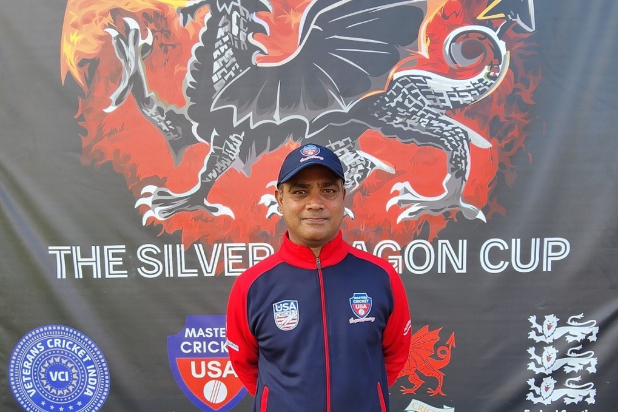
Arun’s earliest memory was that of holding a cricket bat, and his lifelong passion for cricket has remained ever since.
In India, where Arun grew up, the sport of cricket is incredibly popular. When Arun’s father was a young cricketer, he was called up to play for his state in India. The influence of cricket didn’t waver within the family, and Arun was gifted his first official “bat” at the age of 2. Alongside his brother, Arun quickly learned the rules, continuing to play throughout childhood and now adulthood.
Since moving to the US in 1993, Arun has not missed a single year of league cricket in the states that he has lived in (including Colorado, North Carolina, and California). He is part of the USA Masters Over50s National Cricket Team and travels often from his home in Southern California to training and competitions, both domestically and internationally. In March 2023, he represented the USA Masters National Team in a three-nation tournament that included Canada and the West Indies; Team USA won the tournament, remaining unbeaten in all five matches.
In the summer of 2023, Arun traveled to the UK representing the US in a four-nation tournament, which saw England, Wales, India, and the US go head-to-head in several days of competition. While Arun has been on several cricket tours in the past, this was his first time playing in the UK and representing the US overseas. Being on tour abroad allowed more time for team members to spend with each other, bonding perhaps more than during local tours, which Arun found important to the tournament’s success. Additionally, Arun discussed the advantage of playing on authentic cricket fields. “Cricket facilities in the UK are like baseball fields in the US – they are everywhere and top-notch facilities,” notes Arun. “Playing on high-quality fields that were graced by some of the stars of world cricket was an incredible experience.” The tournament was unfortunately impacted by rain and some matches could not be completed. However, Team USA had several memorable performances and Arun was selected as the “Fielder of the Tournament,” a distinct honor highlighting Arun’s dynamic ability as a player.
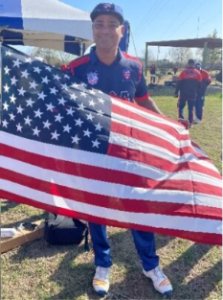
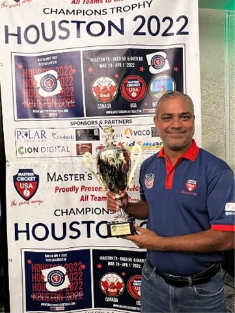
Cricket originated in Southeast England during the mid-16th century, and it spread rapidly alongside expansion of the British Empire. The sport may not be familiar to most in the United States, where we’re accustomed to cheering on mainstream American sports such as football, basketball, and baseball. But around the world, cricket is wildly popular; its viewership exceeds any Super Bowl. Each year, billions of people across the world tune in to watch cricket matches. There are different match formats as cricket has evolved to provide more excitement and entertainment while showcasing the skills and talents of the players. The original version of a match is called a “Test,” where each match lasts five days with a playing duration of six hours per day. The latest evolution is called Twenty20, which lasts about three hours (comparable to a baseball game).
Arun is an “opening bowler,” meaning he bowls (cricket term for “pitching,” although with a different action than in baseball) the ball at a fast pace at the start of a match to try and get the opposing batsman out. This would be a similar strategy to an opening pitcher in baseball who uses a mixture of fastballs, curveballs, etc., to get a batter “out.” An opening bowler sets the tone of the match and jumpstarts its momentum.
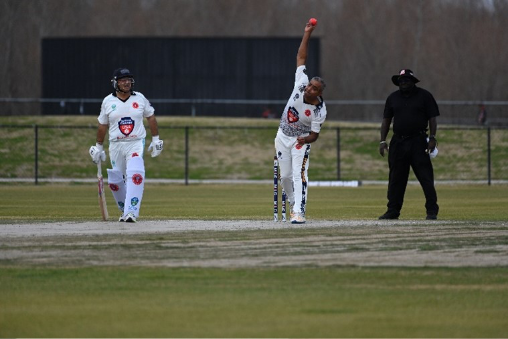
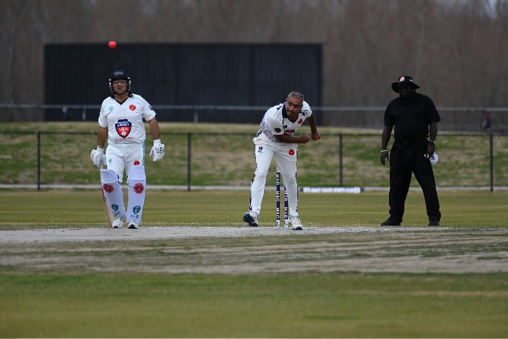
These dynamics of a cricket match are what draws Arun to the sport the most. “Cricket is life in a nutshell: a match encompasses the vagaries of life into a few hours wherein you – and your teammates – face ups and downs,” says Arun. “There are times when you do everything perfectly, but the outcome may not be what you wanted.”
Arun applies these concepts to his work here at Arcus, especially when he’s leading teams. Being part of a team is partially what makes cricket Arun’s favorite sport; it’s also what translates into his influence here at Arcus. “When it comes to my work, I put the focus on what you can control in a situation versus what you cannot. With my team, we try to derive the best outcome by planning and preparing for various scenarios and executing to the best of our ability.” Because much of what Arun does here at Arcus is focused on the long run of product development, he likens the skill of patience he has developed from the longer forms of cricket as a helpful tool, both at Arcus and in life. “Throughout the day, you’re faced with over a dozen ups and downs, and so much emotion,” Arun says, “but in the end, true class shows itself.”
While cricket is in the early stages of expansion here in the US, Arun compares its development to the rise of soccer in the US in the 1980s and 1990s. The US is a country of immigrants and the majority of cricket played here in the US is driven by expats from Great Britain, its Commonwealth nations, and former Commonwealth countries. With more and more resources being poured into cricket, you will see the sport being played in community parks, offered in recreation programs, schools, and other channels.
“The cricket babies are just starting to crawl now,” says Arun, whose own kids have also picked up cricket. He coaches them, and they play on teams with other children at a local youth cricket academy in Southern California.
RECENT ARTICLES
Combining for Change in Kidney Cancer
While there has been substantial progress in treatment in recent years, even more innovative approaches are needed to improve survival, especially when the cancer is metastatic, meaning it has spread to other parts of the body.
From Paper to Pill
There is opportunity to develop new and potentially improved molecules that block HIF-2α to further improve outcomes.
